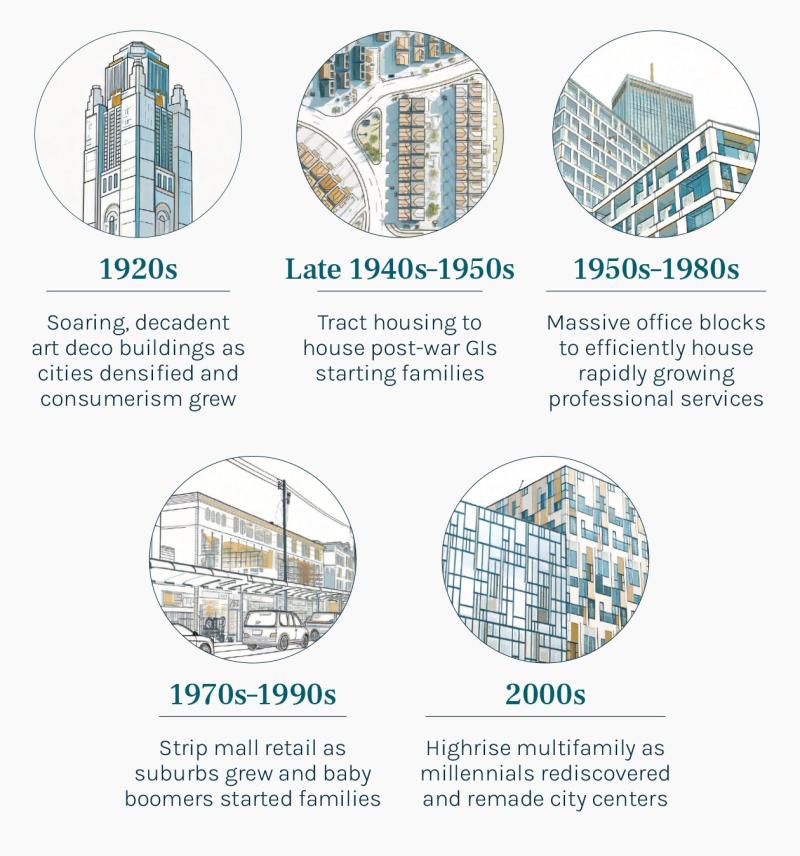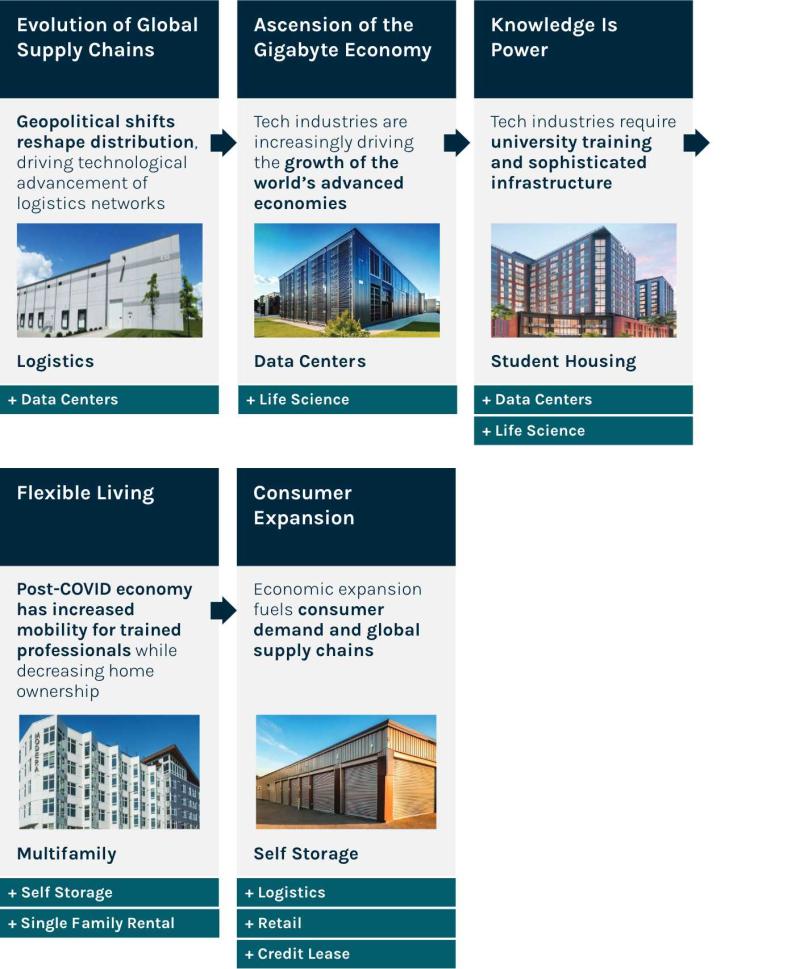What role will you play in the real estate of tomorrow?
Real estate is as important now as it’s ever been, but today’s investors face a challenge: How does the interconnectedness of the digital era—what we at Ares refer to as the New Economy—reshape our relationship to real estate? And what does that mean for the real estate demands of the coming decades? At Ares, we’ve designed our real estate business to meet the demands of the New Economy, and we’re prepared to guide investors into what we believe will be one of history’s most transformational periods for commercial property.
The way we live has changed
At work, our files live on the cloud while we video chat around the world. At home, we order goods with the help of AI shopping tools like chatbots and algorithms. Our orders are fulfilled by robots in automated warehouses and delivered by increasingly smart, electrified connected fleets of vehicles linked by 5G networks. Our refrigerators have screens that tell us when it’s time to reorder our household staples. Our doorbells, light bulbs, garage doors and vehicles all connect to our phones and generate vast quantities of data (the “Internet of Things”). We scroll videos on social media and stream music and shows, while our kids use gaming consoles and virtual reality. Around us, the electricity grid, gas utilities, water pipes and roads are monitored remotely by technicians, creating environments known as “smart cities.”
In addition, we have the entry of artificial intelligence (AI). One AI search requires about 10 times the processing power of a typical Google search. Generating an AI image consumes roughly 50x the processing power, while generating AI videos can take 10,000x or more.
At Ares, we refer to the interconnectedness driven by new technologies—all requiring material increases in cloud adoption and data processing—as the New Economy.
The digital paradigm1
Commercial real estate reflects evolving lifestyles and needs
Consider the real estate trends we’ve seen over the last century:
What does the New Economy mean for real estate sectors?
Real estate is built, reimagined and rebuilt to meet the needs of the society it serves. Today, the New Economy shows up in the real estate that society demands in numerous ways.
As New Economy investors, we are focused on real estate sectors and assets that benefit from increased demand stemming from the adoption of new technologies, demographic trends and changes in consumer preference. New Economy assets and sectors are shaped by digitization, shifts in global supply chains, the desire for flexibility and the role of universities in research and training. In addition, we believe that within traditional real estate sectors, such as retail and office, there is a premium on assets that are built or repositioned to meet the needs of today’s consumer demand.
Real estate sectors benefit from increased demand due to adoption of new technologies, demographic trends and changes in consumer preferences.
Let’s examine these trends in greater detail.
Evolution of global supply chains
The growing influence of ecommerce and the need to get products to customers’ doors quickly have increased the demand for logistics industrial real estate located near ports and near end consumers. Adoption of AI shopping tools such as AI chatbots and algorithms is driving targeted shopping experiences, better customer service and significantly higher traffic, which has converted to growth in online sales. Ecommerce sales require 3x more warehouse space on average than brick-and-mortar retail.2
Since COVID, both production and storage facilities are increasingly located in (“onshoring”) or near (“nearshoring”) the country of consumption to avoid supply chain disruptions. These shifts could accelerate under increased trade barriers and tariffs. The logistics centers that move goods are also increasingly smart, augmented with robotics and automation technology to keep them running efficiently 24/7.
Ascension of the gigabyte economy
Knowledge industries are increasingly driving the growth of the world’s advanced economies. As businesses and governments work to reach their consumers online, automate production lines, move their operations to the cloud for flexibility, use AI to drive efficiency, and deliver and monitor public services remotely, they consume massive amounts of data. In the entertainment world, music, TV, video streaming, gaming, social media and virtual reality all consume massive amounts of data.
As a result, global data usage over the next five years is expected to be up ~3x compared to today.3 That means an anticipated hundreds of billions of dollars in data center real estate developments will be required in just the next five years. These are complicated projects to get done, with longer lead times, the need for specialized teams, and costs that are an order of magnitude higher than traditional industrial real estate.
Knowledge is power
Filling the expertise gap created by the gigabyte economy, in our view, is largely the job of universities. The demand for quality student housing has increased toward higher-end accommodations, well maintained by a trusted manager, with an emphasis on safety for both parents and students. Additionally, the research at those universities and the startups they spawn requires large amounts of laboratory and life sciences real estate.
Flexible living
Affluent, highly educated knowledge workers are generally more mobile than others in the workforce. They often do short stints in cities, work remotely around the globe and choose to rent rather than buy so that their lifestyles remain flexible. Current migration patterns reflect a growing preference for sunbelt locations like Florida, Georgia, the Carolinas, Texas and Arizona.4 Many employees need only a computer for much of their work and routinely work from home, changing their interactions with the office and home. Amenities that used to come from the workplace like quiet workspace, a gym and opportunities for socialization now show up in renters’ preferences for space and amenities in the class A multifamily residential real estate where they live.
Consumer expansion
Consumer behavior is dynamic in the New Economy. In addition to normalizing next-day doorstep delivery for our goods, the increase in renting and mobility amplifies the demand for real estate like storage and hospitality as most consumers value experiences like travel and live hosted events as a reprieve from their increasingly digital world.
To the extent that older, unsuited office and retail locations can be refitted to meet New Economy demands, we believe these properties can present pockets of opportunity as well.
Across the real estate lending landscape, bank retrenchment has resulted in opportunities for private lenders to fill the “supply gap,” which is expected to be about $150 billion annually across the U.S. and Europe.5 With lower competition from banks, private lenders are able to negotiate for higher credit spreads when originating new loans. Those lenders with capital available have the potential to generate equity-like returns with downside loss mitigation.
The promising path ahead
We are all part of the New Economy now, which is driving shifts in real estate. As early contributors in the New Economy, Ares is focused on global supply chains, digitization and the growing demand for data centers, as well as the need for high-quality rental housing near employment centers and universities.
The gaping supply-and-demand imbalance for New Economy real estate presents an opportunity for real estate investors today to help shape the real estate landscape of tomorrow.








